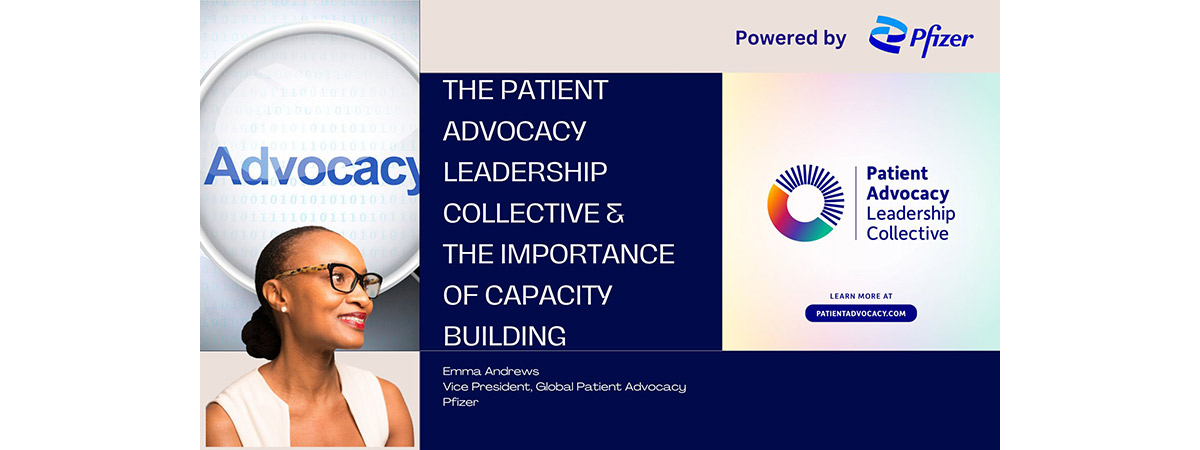The Patient Advocacy Leadership Collective & the importance of capacity building
Emma Andrews
There is immense power in listening and learning from the patient perspective. Through meeting patient advocates and hearing their stories, I witness this in my role everyday as Pfizer’s Vice President of Global Patient Advocacy. To ensure that we are listening and learning from patients, Pfizer values its Global Patient Advocacy Advisory Board to provide counsel and share their experiences. You can meet some of these valued partners in this video.
These stories show that our collective experiences form the basis of our collaboration to empower patient advocates globally. When we acknowledge and value the needs and pain points of patient advocates, then we can come together to share ideas, best practices and, hopefully each other’s successes.
Amidst rapid advances in healthcare, these experiences serve as an important reminder that the landscape of patient advocacy is continuously evolving. Below are a few global statistics to show where inequities are still prevalent in the advocacy space:
• Take health literacy, for example. While the importance of improving health literacy is growing, many health centers are not equipped to provide. In a recent study, 69 percent of respondents noted that a lack of knowledge or training about health literacy poses a huge barrier to its integration.
• Another study has found that, though U.S.-based patient advocacy organizations receive substantial funding, organizations in many other countries are struggling to obtain necessary financial support.
• Even organizations who have a large international focus face barriers across regions. A study focused on rare disease patient advocacy found that while funding and public awareness were the greatest challenges, another top concern is resource distribution and language barriers, of which 26 percent of organization struggled with. These organizations also noted challenges in understanding policy differences across regions.
Among the many challenges that our colleagues face to better support patients worldwide, it is important to underscore that patient advocacy continues to make an impact. Patient involvement and advocacy is on the rise in health research and clinical trials, which has improved the quality of life for patients. This work is invigorating, rewarding and crucial to our fellow man and yet, it can be extremely taxing. Not only do patients’ need support, so do those who advocate on their behalf. It is crucial that advocates around the world are provided with the necessary tools to empower their work with patient communities.
Recognizing that a gap exists, Pfizer partnered with advocates around the world to develop a tool to support patient advocacy organizations in sustainable capacity building. Together, we built the Patient Advocacy Leadership Collective to empower advocates with knowledge and skills through offering evidence-based tools and resources that elevate work in support of patient communities.
Through the Patient Advocacy Leadership Collective, we conducted a needs assessment survey of patient advocates to determine what types of resources would aid in their efforts. Advocates indicated media and messaging training ranked as a top priority. Patient advocates also seek counsel in addressing misinformation, measuring outcomes and key performance indicators (KPIs), and improving donor relations. They also want to better understand how to successfully influence healthcare policies and regulations and promote and support research and access to medicines.
Among the vast needs of this community, one pressing need remains constant – strong and effective leadership. Of all the programs and resources offered through Patient Advocacy Leadership Collective, one that I would like to highlight is the NexGen Leadership Program, which aims to provide tools and resources to support the growth and development of leaders in patient advocacy. It will provide the training needed for organizations and leaders to grow their capabilities and serve patient communities to the best of their abilities. With this resource, we hope to help address some of the key priorities for patient advocacy organizations to build capacity and cultivate the next generation of leaders.
By fostering a culture that intently listens and learns from patients, we are aspiring to create a truly patient-centric health-care system. Effective leadership skills are critical in ensuring that we can support patients as they navigate this complex health environment so that all patients, regardless of where they live, will have access to safe, high quality and affordable healthcare.


